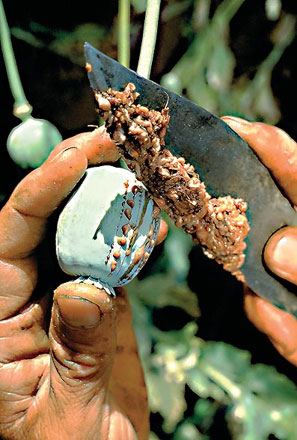NATO and Russia clashed on Wednesday over how to tackle the drug problem in Afghanistan, where Western nations have been fighting a Taliban-led insurgency for eight years, dpa reported.
The country is the world's largest producer of poppy seeds, a key ingredient in the manufacture of heroin. Russia is keen to pursue an aggressive eradication strategy, while Western allies fear that such an approach risks antagonizing the local population, who rely on selling poppy crops to survive.
The different points of view came to a head at a meeting of the NATO-Russia Council attended by the head of Russia's Federal Drug Control Agency (FSKN), Victor Ivanov and NATO Secretary General Anders Fogh Rasmussen.
"Afghan opiates led to the death of 1 million people by overdose in the last 10 years, and that is United Nations data. Is that not a threat to world peace and security?" Ivanov asked journalists after the meeting.
In his speech to NATO diplomats, a copy of which was handed to the press, Ivanov stressed that "NATO is fully responsible for normalizing the situation in Afghanistan, including the elimination of drug production."
The Russian official presented a 7-point plan that foresees, among other things, an extension of the UN mandate for NATO troops in Afghanistan that would oblige them to eradicate poppy fields, as well as targeting the Taliban-led insurgency.
Ivanov said at least 25 per cent of the opium crop should be destroyed as part of the proposed joint NATO-Russia plan. He added that Marjah, the former Taliban stronghold that NATO troops cleared in recent weeks, offered a "unique opportunity" to start the effort.
But NATO spokesman James Appathurai indicated that allies were not ready to follow Russia's suggestions.
"We cannot be in a situation where we remove the only source of income for people who live in the second poorest country in the world without being able to provide them an alternative. That is simply not possible," he told journalists.
However, he stressed that there was "a very positive mood" in the talks with Ivanov and said that the two sides agreed to boost an already existing programme that involves joint training of Afghan counter-narcotics police.
Heroin addiction is a big problem for Russia. According to figures cited in Ivanov's speech, Russia was the single largest consumer of heroin in 2008, with 21 per cent of world production ending up in its territory.
"In Russia up to 30,000 people are killed annually from Afghan drugs ... almost every family in Russia has been affected," the head of the FSKN stated.
NATO rejects Russia's demand to destroy Afghan poppy fields
NATO and Russia clashed on Wednesday over how to tackle the drug problem in Afghanistan, where Western nations have been fighting a Taliban-led insurgency for eight years, dpa reported.






